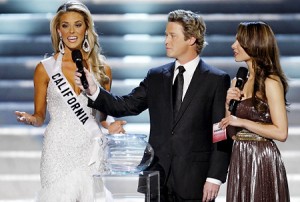Is Verizon on the Horizon? Rumor of Apple iPhone Partnership with Verizon Wireless
April 28, 2009 3 Comments
I’ve been an Apple computer user since the mid-80s. On the recommendation of a friend, I purchased the Mac SE just in time to use a personal computer for my last university assignment—my doctoral dissertation. Now my students Twitter and tidy up their Facebook presence on their MacBook Pros—probably during class.
I’m on my third laptop and our family is on its second iMac (now due for a successor). I’m a Mac enthusiast. But I don’t bother extolling the virtues of the Mac over a PC when they should be obvious to everyone by now. I suspect most “PC users” balk at the price of a Mac. There’s a little-known aphorism that “you get what you pay for.” Buying my first Mac may be the best purchase I ever made. (Thank you, Bill Mounce, for your compelling recommendation over 20 years ago!)
Eventually I caved to the iPod frenzy. The fact is, I don’t use it much. Never did. I’m much more boring than that.
Then the iPhone arrived. It looked great to me then and it looks even better now. Knowing there would be a second-generation iPhone, I resolved to wait and let Apple work the kinks out. But there was another reason that kept me at bay—I was a faithful Verizon Wireless user, and I was reluctant to move over to AT&T. So I delayed. I let my two-year contract mature and waited for what became the iPhone G3. I figured I could worry about Verizon vs. AT&T service comparisons when the time came.
The time has come. Today I take the dive. Before the day is out, I expect to be iPhoned-up. But I have deliberated more about this decision than I did about that first computer I bought. And choice of wireless provider has been one of four determining factors for me. The other three are increased cost for service, the competition from Blackberry’s Storm, and the prospects of a new iPhone being announced as early as this summer.
Today I learned (here) that Verizon and Apple may reach an agreement to work together, and that a Verizon-iPhone package could be online in 2010. I learned this folllowing my decision to take the leap. Why am I not moved by this rumor?
For starters, because it’s a rumor (as everything Apple is at first). Second, there’s no solid evidence that an agreement is in the works. Third, rumors of a release as early as 2010 seem to me to be greatly exaggerated. And fourth, I can go back to Verizon later on a technology upgrade. (That’s what we do as consumers now. Brand loyalty is much more fragile than it used to be. And the obsolescence of gadgets—sometimes planned—is one major reason.)
I’m ready to give AT&T the benefit of the doubt. Will I regret it? It’s possible—which is one reason why I’m saving a hundred bucks and buying the 8 gig instead of the 16 gig device. As for giving Apple the benefit of the doubt and switching to an iPhone, what could that possibly mean? In my experience, there’s never been any basis for doubting Apple’s leading edge.
In fact, the only release that ever really surprised me was when Apple partnered with AT&T in the first place. Looked at another way, this decision, which had to be made with the usual Apple vigilance, improved AT&T’s reputation with me.
Corporations have cultures. The Apple culture is unique. There isn’t a wireless provider anywhere on earth that does R&D and marketing like Apple does. But you can’t make a phone without relying on a wireless provider. So Apple took an unprecedented step when it entered a mutually dependent relationship with AT&T. Who has benefited more, Apple or AT&T? From where I sit, there isn’t an obvious answer to this question. Without an independent service provider, there wouldn’t be an iPhone. And Apple has greatly bolstered its bottom line with its sales of iPhones. AT&T is a winner because it’s become an attractive option among consumers, even consumers like myself who have never had much of a complaint during a decade of Verizon wireless service. Its bottom line is much improved, as well.
Verizon has mounted a vigorous campaign to sell the Blackberry Storm smart phone as an alternative to the iPhone. This is good advertising for Apple’s singular phone. (No pun intended on the word “singular,” there.) Verizon and Blackberry tacitly acknowledge the cutting-edge leadership of Apple. Apple raised the bar and they’re trying to keep up. So Verizon is in a defensive mode.
Some have argued that Apple and Verizon are such uncompromising companies that a partnership is almost certainly out of the question. Maybe so. My impression is that Apple is more likely than Verizon to get what it wants in a partnership. And this leads me to wonder: what does Apple want; could Apple eventually control AT&T wireless, reinvent its business plan using the Apple template, and surpass Verizon?
Stranger things have happened.


Recent Comments